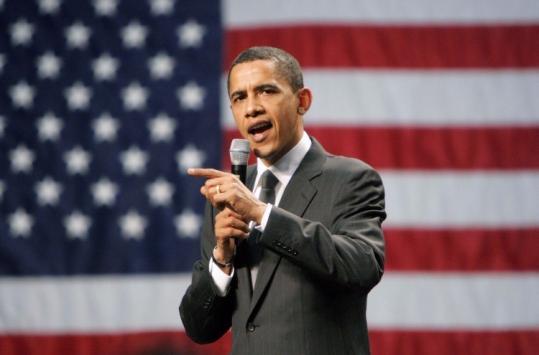As it faced the most historic presidential vote of modern times, the United States explored how far it had come in the 40 years since the Civil Rights campaign led by Martin Luther King overthrew black segregation. While travelling across the southern US from Georgia to Louisiana, through the heartland of the former Confederacy, JOHN HARRIS asked ordinary Americans about their country’s change of heart that elected its first black president on November 4.
I've seen the Promised Land. I may not get there with you. But I want you to know tonight, that we, as a people, will get to the Promised Land.
Rev. Martin Luther King Jnr, Memphis, Tennessee, April 3, 1968
“The way I see it, Obama is the luckiest guy in the USA.”
The words belong to a street hawker peddling pro-‘bama tee-shirts and badges on the forecourt of an abandoned gas station in Oxford, Mississippi, the morning after Democrat candidate Barack Obama’s first debate with his Republican opponent John McCain.
This election entrepreneur is commenting on Obama’s unlikely candidacy for the US presidency: The young half-African former community organiser emerged from nowhere leading a campaign for change to snatch the Democratic Party’s presidential nomination from its heir apparent, Hillary Rodham Clinton. This tee-shirt merchant is convinced Obama’s luck will hold against McCain.
While commentators called the debate a draw, it marked the start of Obama’s acceleration in polls from slightly behind McCain to a double-digit lead just two weeks out from the vote.
Luck, meticulous organisation and the inexorable force of history have all played their role in the rise and rise of the Obama candidacy and the increasing likelihood of the US electing its first black president.
In the race for the presidency, race is the iceberg issue in this campaign – it is widely recognised but little understood in terms of the impact it will have on the presidential vote. African Americans make up the largest racial minority in the United States. The US has more than 37 million black citizens, making up about 12.4 per cent of the population.
In his landmark speech, A More Perfect Union, on March 18, Obama said race was an issue the US could not afford to ignore. “I have never been so naive as to believe that we can get beyond our racial divisions in a single election cycle, or with a single candidacy - particularly a candidacy as imperfect as my own,” he said.
“But I have asserted a firm conviction – a conviction rooted in my faith in God and my faith in the American people – that working together we can move beyond some of our old racial wounds, and that in fact we have no choice if we are to continue on the path of a more perfect union.”
Although Obama has widespread support among black Americans – most notably this week’s endorsement by former general Colin Powell – it is neither unequivocal nor predominantly focused on his colour.
Alabama businessman Greg Lane said the major issue of the election was not race. “We have some very pressing issues that are affecting, not just African Americans, but they’re affecting everyone, and we need to come up with solutions,” he said. “I honestly don’t think a balanced budget is going to fix it. I don’t think a Democratic-controlled Congress is going to fix it. And I don’t really think it will really matter what colour the president is.
"What I’m concerned about is someone that’s going to get in office and actually do what they say they are going to do.”
Former Marine David Greer, who is now living rough on the streets of Louisville, Kentucky, said that while he supported Barack Obama, he had some reservations. “Barack Obama is being commercialised into something that he thinks the American people want him to be, rather than being who he really is,” he said.
“Now Barack Obama, he shall be the next up-and-coming president if – and I emphasise the word ‘if’ – he stands his ground and goes for what he says: Change that we can believe in.”
For the past month, the historic possibility of the first black president has been overshadowed by the equally historic meltdown of the US financial system and the US $700 billion bailout that the US Government is hoping will haul it back from the precipice.
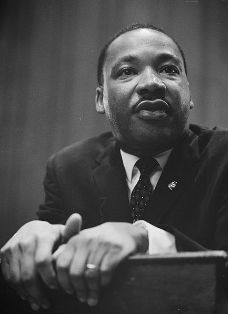 Yet it is just 40 years since April 4, 1968 when the Reverend Dr. Martin Luther King Jnr. was gunned down on a Memphis motel balcony, while leading a national campaign for Civil Rights that shone the spotlight of shame on the overt racism endemic of the Old South. Dr. King’s non-violent movement ignited national outrage which led to the Civil Rights Act of 1964, a piece of landmark legislation that banned racial segregation in schools, workplaces and public places.
Yet it is just 40 years since April 4, 1968 when the Reverend Dr. Martin Luther King Jnr. was gunned down on a Memphis motel balcony, while leading a national campaign for Civil Rights that shone the spotlight of shame on the overt racism endemic of the Old South. Dr. King’s non-violent movement ignited national outrage which led to the Civil Rights Act of 1964, a piece of landmark legislation that banned racial segregation in schools, workplaces and public places.
If Dr. King were to survey his homeland today, would he celebrate or commiserate the achievements of his fellow African Americans? Certainly, for the first time in the history of the Union, a black man stands at the portal of the presidency. The only hurdle between Obama and the highest office in the land is the voice of the people, which will speak on November 4.
However Dr. King would also see that the five decades since he started his fight for Civil Rights have not delivered his people into their “promised land” of equality and justice: The shadow of racial segregation lingers in the statistics that measure the lives of black Americans.
Blacks are twice as likely to be unemployed as whites. Every third young African-American is out of work. One in nine black men aged 20 to 34 is behind bars - more than six times the rate of their white countrymen.
More than half reside in the US South, in states including Georgia, Alabama, Tennessee, Mississippi and Louisiana.
The South is a land with a long memory: Indeed, some southerners still refer to the Civil War as “the War of Northern Aggression”. For the century after Republican President Abraham Lincoln abolished slavery, the South voted Democrat: Since Democrat President Johnson signed Civil Rights into law in the 1960s, the South has voted almost wall-to-wall Republican.
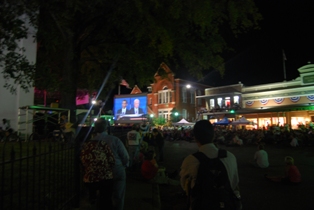 Oxford, Mississippi, a university town about 100km south of Memphis, epitomises that southern conservatism. Radiating prosperity in stark contrast to the poor Mississippi delta towns to its west, Oxford is home to the University of Mississippi – dubbed “Ole Miss” by locals – which hosted the first 2008 presidential candidates’ debate in late September.
Oxford, Mississippi, a university town about 100km south of Memphis, epitomises that southern conservatism. Radiating prosperity in stark contrast to the poor Mississippi delta towns to its west, Oxford is home to the University of Mississippi – dubbed “Ole Miss” by locals – which hosted the first 2008 presidential candidates’ debate in late September.
In the Library Sports Bar on Oxford’s trendy Van Buren Street, packed with a Friday night coterie of athletic lads and glamorous coeds, a cheer erupts every time McCain makes a point from the phalanx of plasma screens arrayed around the walls and ceilings. Silence greets Obama’s comments.
The applause is more even-handed in Oxford’s Jackson Square, in front of the stately Lafayette County Courthouse, where hundreds of people watch the debate on open air projector screens. But McCain still earns the loudest cheers.
During two weeks in September and October travelling through the southern states, the heartland of the former Confederacy, I asked dozens of ordinary Americans about the choice they face in voting for their next president and the challenges he will face.
The two most visible issues in Australia – the vexed issue of the next president’s race and the Iraq war – were rarely mentioned as factors in deciding how to vote.
Many regard the Iraq war as a mistake. Resentment simmers about its $10 billion a month cost which sends US resources overseas rather than using them to help Americans.
A sign in the still-shattered Ninth Ward area of New Orleans, which was devastated by flooding from Hurricanes Katrina and Rita in 2005, sums up this frustration: “Mr. Bush, rebuild New Orleans, not Baghdad.”
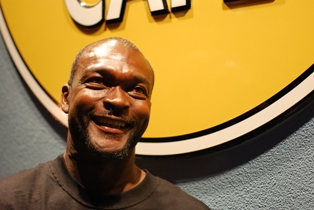 More than 1100 km north of New Orleans, in Louisville, Kentucky, the hometown of world heavyweight great Mohammed Ali, former US Marine David Greer says the war is all about money. “There were no weapons of mass destruction, it was solely for the purpose of sewing up petroleum, crude oil, America’s number one source of energy,” he claims.
More than 1100 km north of New Orleans, in Louisville, Kentucky, the hometown of world heavyweight great Mohammed Ali, former US Marine David Greer says the war is all about money. “There were no weapons of mass destruction, it was solely for the purpose of sewing up petroleum, crude oil, America’s number one source of energy,” he claims.
“This is not about our freedom. If it was, then why don’t they drop some of those helicopters and aeroplanes full of commodities right here in Louisville? Why take them way across seas? Why drop out Nike tennis shoes and T-shirts and stuff to Iraq?
“We have spent over $500 billion in Iraq, but we won’t even spend $500,000 in Kentucky to help restore the lights for the citizens of Louisville after Hurricane Ike cut off our electricity.”
Despite eight years in the armed forces, David Greer is homeless today, a victim of the ailing health system that both Obama and McCain are promising to remedy. He is on the street after spending his savings on medical costs for his arthritic hand, which he hurt in a work accident in 2007. The health insurance company rejected his claim by describing arthritis as a “pre-existing condition”.
David, who now peddles acrostic poems along 3rd Street in downtown Louisville, notes that Obama had big shoes to fill in order to stand alongside great black Americans. “I would say Martin Luther King and Muhammad Ali had a foundation to stand on,” says the shaven-headed 41-year-old.
“They stood their ground and they made sure that they didn’t fall short of what they stood for. For instance, Cassius Clay, before he was Muhammad Ali, refused to serve this country for something that he didn’t believe in. As with Martin Luther King, he believed that he was equal to every other person in America and that’s what he stood for and he did not falter from that. He stood his ground and he has made this place a better place, not just for blacks, but for everybody.
“Cassius Clay made a change and Martin Luther made a change. Barack Obama, we need you to stand and make a change.”
“The Change We Need” is the slogan for Obama’s presidential campaign: But that change started more than 50 years ago, when the idea of a black president was even more fanciful than a man walking on the moon.
The march on that path of change started on December 1, 1955 in Montgomery, Alabama, when 42-year-old black woman Rosa Parks refused to give her seat for a white passenger. This simple act of resistance led to the Montgomery Bus Boycott, a campaign of civil disobedience that transported Martin Luther King, fresh from bible college, into a role of national prominence at the forefront of the Civil Rights movement.
Montgomery, a city of 200,000 people on the Alabama River, celebrates its Civil Rights heritage with the Rosa Parks Museum, the Civil Rights Museum and the Dexter Avenue King Memorial Church – the only church where Dr King served as a pastor.
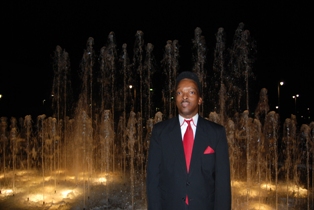 Montgomery taxi entrepreneur and chauffeur Greg Lane said the top three issues facing the United States of America were its inadequate health care system, its rising unemployment rate and inadequate housing. “Obama is a good candidate and I think that he will make America better, but I’m not so concerned about colour, nor am I concerned about a Republican versus a Democrat,” he says.
Montgomery taxi entrepreneur and chauffeur Greg Lane said the top three issues facing the United States of America were its inadequate health care system, its rising unemployment rate and inadequate housing. “Obama is a good candidate and I think that he will make America better, but I’m not so concerned about colour, nor am I concerned about a Republican versus a Democrat,” he says.
“What I think is, we have got to go back to what this country was founded on - “in God we trust” - and we need to learn how to work one with another, so we can sit down and come up with ideas as to what can we do now to help solve some of these problems.
“It’s going to take all of us as a whole, we all are going to have to work as a team. And I think that if we do that, if we work together as opposed to working against one another, then we can get where we are trying to go and ultimately the race will be won.”
Perhaps the most perplexing part of the presidential campaign is that nobody trusts the polls despite double digit leads that should guarantee Obama a landslide victory.
One factor is the widely reported “Bradley effect”, which describes an alleged discrepancy between pre- and post-election results in US political campaigns where candidates of different race run against each other. Named after the African-American who lost the 1982 California governor's race despite leading in the polls, the theory claims some voters give a “socially desirable” answer to pollsters to avoid being tagged racist.
Despite its impact reportedly declining during the past decade, the import of the Bradley effect is that not even Obama supporters are taking victory for granted.
Although the prospect of a black man sitting in the White House is a powerful symbol of the change of heart that has occurred in the US during the past half century, it may only prove a preamble to the change to come if the nation unites behind the leadership of an African-American.
After all, it has happened before.
Greg Lane says Martin Luther King stands as the most influential figure in Alabama because of his inclusiveness. “When he came here about 53 years ago, he changed Montgomery as a whole,” he observes.
“He taught us to love in spite of our differences or whatever the problem may be. He taught us to that it will get better over time and that we need to still love each other and care for one another, because, in God's eyesight, we are all his children.”
In his speech launching the Montgomery bus boycott on December 5, 1955, Martin Luther King welcomed people to the Holt Street Baptist Church “for serious business”. “We are here in a general sense because first and foremost we are American citizens and we are determined to apply our citizenship to the fullness of its means,” he said.
On Tuesday week, Americans will exercise their rights of citizenship to elect the country’s 44th president and – if the polls are accurate in their predictions – a black American will sit finally at the front of the bus.
Related News
- North America 2007: Stargazing on top of the world at Flagstaff, Arizona At 7000 above sea level, Flagstaff had John wheezing for air as he hauled the bags to the bedroom at the Hampton Inn Suites. Ironically, it was the only place in the US that Eden a...
- North America 2007: Relax at LAX LA International Airport - did I forget to brush my teeth? {gallery}usa//lax{/gallery} ...
- North America 2007: Washington DC Meeting squirrels by the White House Highlights of our 24 hours in the seat of western power Eden feeding squirrels in front of the White House A "city lights&q...
- North America 2007: Aloha Hawaii Shopping, sunshine and smiles -aloha Hawaii, but the Pipeline was flatter than John's singing {gallery}usa//hawaii{/gallery} ...








